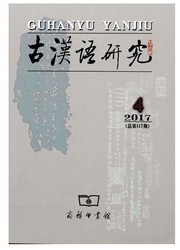

 中文摘要:
中文摘要:
“石”是汉语中的一个常用名词。从上古到中古“石”一直有zyak或咎zlεk的读音和“大”的义项。上古和中古时期的“硕”也有上述两个读音。从现代汉语方言材料来看,“石”跟“硕”在读音上发生分化的时间是近代以后。虽然“硕”也有“大”的义项,但跟“石”不同的是,该义项是其语源义,而“石”所具有的“大”的义项是由于跟“硕”读音相同,通过通假的方式获得的,其本身并无该义项。“石”的“量器”义是在其为“容器”义的基础上发展而来的。由于“石”经常作为称重物的量器,因而后来在此基础上发展出作为重量单位词的义项。表示“谷一百二十斤”的“石”跟“柘”是同源词。“石”读为“儋”的原因之一是从俗,其发生的语言基础是汉语中存在的同义换读现象。
 英文摘要:
英文摘要:
" shi(石) "is an often used noun is Chinese. In both ancient times and mediaeval times, the word "shf (石) "has two pronunciations and with the meaning "big". The word" shub (硕) "also has the same conditions both on pronunciations and meaning. But from modem dialects we can see that after latter-day divergence takes place on their pronunciation. Although "shub (硕)" has the meaning "big", it' s its original meaning which is different from that of the word "sht(石) ". The two words "shi(石) "and "shf (禾石) " are cognate words. One of the reasons that "shi ( 石) " is pronounced as "da n (擔) " is to follow the general customs .It is the phonetic transformation of the same meaning which lays in Chinese that causes it.
 同期刊论文项目
同期刊论文项目
 同项目期刊论文
同项目期刊论文
 期刊信息
期刊信息
